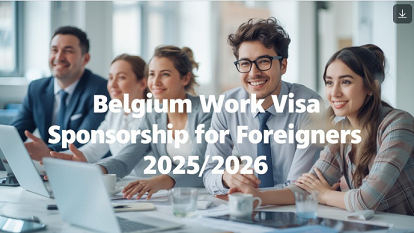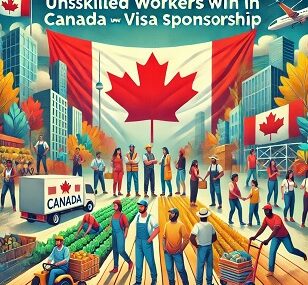Belgium Work Visa Sponsorship for Foreigners 2025/2026
Belgium is one of Europe’s most attractive destinations for skilled and unskilled workers alike. Its economy is diversified – from technology and logistics to health care and domestic support – and the Belgian government has created a framework that allows employers to sponsor foreign workers when local labour is not available.
This guide explains, in simple but comprehensive language, everything a foreign national (including applicants from Africa, Asia or Latin America) needs to know about Belgium work visa sponsorship in 2025. We will cover:
-
The different types of Belgian work visas and permits
-
What “visa sponsorship” actually means in Belgium
-
Sectors actively recruiting foreigners in 2025
-
Step-by-step application process
-
Documents required for a strong application
-
Processing times, fees and validity periods
-
Rights and obligations once you arrive
-
Common mistakes and how to avoid them
-
Frequently asked questions
Everything here is for informational purposes only. Always double-check details with the Belgian embassy or regional authority before submitting your application.
Understanding Belgium’s Work Visa System
Belgium does not issue a one-size-fits-all “work visa” the way some countries do. Instead, it combines two elements:
-
The right to work – confirmed through a work permit or single permit issued by a regional authority (Flanders, Wallonia or Brussels).
-
The right to enter and stay – confirmed through a long-stay (Type D) visa issued by a Belgian embassy or consulate abroad.
In most cases, your Belgian employer applies for the work authorisation on your behalf. Once the work permit is approved, you take that approval to the embassy to apply for your visa. This is what people mean by “visa sponsorship” – an employer in Belgium formally undertakes to hire you, and that commitment is the basis for your visa.
Belgium Work Visa Sponsorship for Foreigners 2025/2026
What “Visa Sponsorship” Means in Belgium
When an employer in Belgium offers you a job and applies for your work permit or single permit, they become your sponsor. Sponsorship involves:
-
Filing the work authorisation application at the competent regional authority.
-
Demonstrating that the position cannot easily be filled by a Belgian or EU/EEA citizen (particularly for unskilled or mid-skilled jobs).
-
Providing you with an employment contract and sometimes accommodation or relocation support.
-
Ensuring you will be paid at least the minimum salary threshold for your category.
Without a sponsoring employer, most non-EU foreigners cannot obtain a Belgian work visa.
Types of Belgian Work Permits and Visas (2025 Update)
Belgium has reformed its system to simplify categories. In 2025 you will generally see the following:
-
Single Permit (Combined Work and Residence Permit)
For stays over 90 days. Your employer applies, and once approved you receive a Type D visa to enter Belgium. -
Work Permit B
For temporary employment under specific conditions, usually issued for up to one year but renewable. -
EU Blue Card
For highly skilled workers meeting salary and qualification thresholds. Allows easier mobility within EU after a certain period. -
Seasonal Work Permit
For short-term jobs in agriculture, horticulture, tourism or hospitality. -
Intra-Corporate Transfer Permit
For managers, specialists or trainees being transferred within multinational companies.
For most foreigners seeking regular employment, the single permit route is the standard.
Sectors Recruiting Foreign Workers in Belgium 2025
Belgium faces labour shortages in several areas. In 2025, the following sectors are expected to actively sponsor foreign workers:
-
Health Care – nurses, caregivers, elderly care assistants, home care workers.
-
Information Technology – software developers, cybersecurity specialists, data analysts.
-
Engineering and Technical Trades – welders, mechanics, electricians.
-
Construction and Infrastructure – masons, crane operators, project managers.
-
Hospitality and Tourism – hotel staff, chefs, housekeeping staff during peak seasons.
-
Agriculture and Food Processing – seasonal farm workers, food production operatives.
-
Domestic Support Services – live-in carers, housekeepers under regional programmes.
Each region of Belgium maintains a list of “shortage occupations” which are easier to sponsor.
Eligibility Criteria for Belgium Work Visa Sponsorship
While each permit has its own rules, the general eligibility criteria for foreign workers are:
-
A valid job offer from a Belgian employer willing to act as your sponsor.
-
An employment contract meeting the minimum wage thresholds for your job category.
-
Qualifications or work experience relevant to the offered position.
-
Clean criminal record certificate.
-
Medical certificate proving you are fit to work.
For highly skilled jobs, you may also need a university degree. For unskilled or seasonal jobs, practical experience can be enough.
Documents Required
Prepare the following core documents before applying:
-
Completed long-stay visa application form (Type D).
-
International passport valid at least 15 months beyond your planned entry date with blank pages.
-
Two recent biometric passport photos.
-
Original employment contract signed by you and the Belgian employer.
-
Work permit or single permit approval issued by the regional authority.
-
Police clearance certificate from your home country covering the last 12 months.
-
Medical certificate from an embassy-approved doctor.
-
Proof of accommodation in Belgium (if provided by employer).
-
Evidence of professional qualifications or CV/resume.
-
If applicable, marriage or birth certificates for accompanying family members.
All documents not in Dutch, French, German or English must be translated by a sworn translator.
Belgium Work Visa Sponsorship for Foreigners 2025/2026
Step-by-Step Application Process
Step 1: Secure a Job Offer
Search for positions in your field and apply directly to Belgian employers. When an employer agrees to hire you, they begin the sponsorship process.
Step 2: Employer Applies for Work Authorisation
Your employer files for the single permit or work permit B with the competent regional authority. Processing can take several weeks to a few months depending on the region.
Step 3: Receive Approval Notification
Once the regional authority approves the work permit, they notify the Belgian Immigration Office, which then informs the embassy.
Step 4: Apply for Type D Visa at the Embassy
Take the work permit approval plus your documents to the Belgian Embassy or Consulate in your country. Complete the visa form, pay the visa fee, and submit biometrics.
Step 5: Wait for Visa Decision
Processing times vary but average 30–60 days. Apply early to avoid delays.
Step 6: Travel to Belgium and Collect Residence Card
On arrival, register at your local commune within 8 days. You will receive a residence card which also serves as your work authorisation.
Processing Times and Fees
-
Work permit/single permit: Employer’s application can take 4–12 weeks.
-
Visa Type D: Embassy processing about 30–60 days.
-
Fee: Visa handling fee around €180 plus regional administrative fee (the employer often pays part of this).
Salary Thresholds and Employment Conditions
Belgium sets minimum salary thresholds for different categories:
-
Highly skilled workers: a higher monthly gross salary (updated annually).
-
Shortage or mid-skilled jobs: lower threshold but must still meet regional minimum wage.
-
Seasonal workers: daily or hourly rates as set by sector agreements.
Employers must also respect Belgian labour laws on working hours, holidays, and social security contributions. As a sponsored worker you are entitled to equal treatment with Belgian nationals in terms of pay and working conditions.
Rights and Obligations of Sponsored Workers
As a foreign worker in Belgium under sponsorship:
-
You may live and work legally for the duration of your permit.
-
You are entitled to health insurance and social security benefits like Belgian workers.
-
You must notify authorities of address changes and renew your permit before expiry.
-
Changing employers may require a new work authorisation unless you have an open-ended status (such as long-term resident after several years).
Bringing Your Family
After you start working in Belgium you may be able to apply for family reunification so your spouse and children can join you. They will receive residence cards and, in many cases, permission to work.
Common Mistakes to Avoid
-
Accepting job offers from unlicensed recruiters promising “guaranteed visas” without contracts.
-
Submitting incomplete or inconsistent documentation.
-
Not meeting the salary threshold for your category.
-
Arriving in Belgium on a tourist visa and trying to convert it to a work permit (generally not allowed).
Tips for a Strong Application
-
Keep your CV and qualifications up-to-date and translated into a Belgian language or English.
-
Prepare clear scans of your documents.
-
Apply well in advance of your intended start date.
-
Maintain honest communication with your employer and embassy staff.
-
Show that you meet integration requirements (language skills can be a plus but not mandatory for many jobs).
Belgium Work Visa Sponsorship for Foreigners 2025/2026
Frequently Asked Questions
Q1: Can I get a Belgian work visa without a job offer?
No. Belgium requires a sponsoring employer for non-EU nationals.
Q2: How long can I stay on a single permit?
Usually one year, renewable, tied to your employment contract. After several years you can apply for long-term residence.
Q3: Can my employer provide accommodation?
Yes, some employers offer free or subsidised housing, especially for live-in care, agriculture or seasonal work. This can be included in your sponsorship package.
Q4: What happens if I lose my job?
You may have a short period to find another employer but usually a new work authorisation is needed.
Q5: Is knowledge of French, Dutch or German required?
Not always, but it increases your employability and integration prospects.
Step-By-Step Checklist
-
Secure a job offer and contract from a Belgian employer.
-
Employer applies for work permit/single permit.
-
Gather documents: passport, photos, police clearance, medical certificate, qualifications.
-
Apply for Type D visa at Belgian Embassy.
-
Pay visa fee and submit biometrics.
-
Receive visa and travel to Belgium.
-
Register at local commune and collect residence card.
Conclusion
Belgium’s work visa sponsorship system in 2025 gives foreigners a structured pathway to live and work legally in the heart of Europe. The process requires an offer of employment, careful preparation of documents, and patience with processing times, but thousands of non-EU citizens successfully obtain these permits every year.
Whether you are a highly skilled IT professional, a nurse, a construction worker, or a caregiver, Belgium’s shortage of labour in many sectors creates opportunities for you. By understanding how sponsorship works, meeting the eligibility requirements, and following the step-by-step process laid out in this guide, you can approach your application with confidence.






